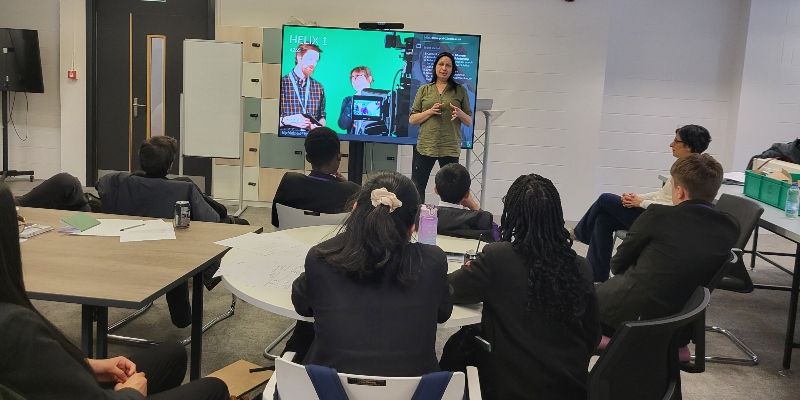Campaigner Sarah Lloyd, whose 17 year-old son died after being brutally stabbed, has shared the devastating impact of his death with local schoolchildren in an anti-knife crime initiative.
The University of Leeds is a partner in West Yorkshire Police's Junior Detectives scheme, which aims to tackle the scourge of knife crime across the district.
The week-long programme was designed to help young people become 'knife crime ambassadors' in their schools and communities.
Pupils heard about a fictional stabbing incident, helped the forensics team at a mocked-up crime scene and saw how an investigation leads to a court case.
The initiative is part of Project Shield, which was launched at the unveiling of the Knife Angel at Leeds' Royal Armouries museum in February. The Knife Angel is a giant sculpture made from more than 100,000 bladed weapons seized by the police. It was created to show the appalling effects of violent crime.
As part of her campaign to reduce knife crime, Sarah, who is studying for an MA in Social Research at the University of Leeds, spoke at the unveiling of the Knife Angel and gave support throughout the Young Detectives initiative, including leading a session about the impact of knife crime.

The young people aged 12 to 13 from Leeds City Academy learned about the circumstances that led to her son Kieran's death and how this kind of violence can be the result of criminal exploitation linked to gangs.
Sarah described how Kieran loved working as a butcher but turned to petty crime when he lost his job, including selling cannabis for a dealer.
Despite efforts to break free from this, he was ultimately stabbed to death after being confronted by the dealer.
They say time heals but it doesn't. I feel as desperately sad as I did ten years ago.
Sarah said: "Kieran was not perfect but he still didn't deserve to have his life taken.
"He was starting to turn his life around when he died. I know he would have made a decent man."
The impact of his death on the family was devastating, says Sarah, adding: "They say time heals but it doesn't. I feel as desperately sad as I did ten years ago. And my other children don't celebrate their birthdays anymore."
The group also heard from police officers and medical professionals, who work with the University, about how they deal with the terrible consequences of knife crime.
At the end of the week, pupils saw the inside of Leeds Crown Court where they met His Honour Judge Christopher Batty and watched a dummy court hearing.
Professor Sonia Kumar, Professor of Medical Education and Associate Dean of Community Engagement at the University of Leeds, said: "Sarah's passion and lived experience of knife crime is a perspective we can all learn from.
"The University of Leeds is proud to be a key partner in this important project. We have supported the initiative with the expertise and the facilities of the School of Medicine, School of Law, the Careers Service and Helix where many of the workshops were held.
"There is an urgent need to turn the tide against knife crime so we are keen to work with partners such as the Police and the NHS and hope this kind of project will have an impact and reduce the violence that is so damaging to our communities."
Sonia highlighted the importance of working collaboratively for the good of the local community. A collective was formed a year ago called the Community Engagement Network in Research, Education and Civic Engagement (CENTRE).
"By working more collaboratively, we can make great strides in benefitting local people's lives and the experience of our staff and students," she said.
"Youth violence is a public health emergency that touches us all. Working together with other agencies is the best chance we have in combating this appalling situation."
Other partners involved in the Young Detectives programme include St Giles Trust and Leeds Rhinos Foundation.
The week concluded with the pupils being presented with certificates at an event held at Headingley Stadium.






